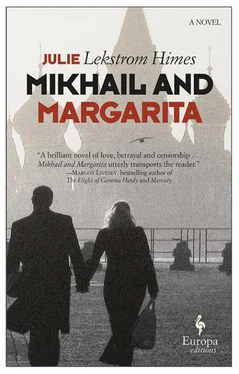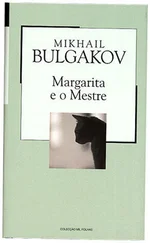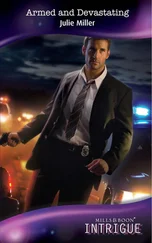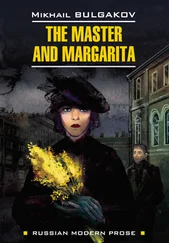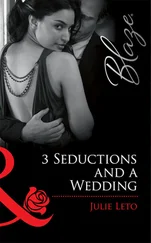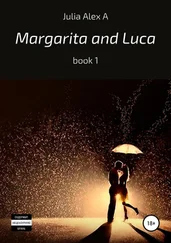“Of course we want to do something,” said Beskudnikov. He looked at the others, summoning a tone of chairman-like magnanimity. “We’ve discussed a collection—food, perhaps.” He paused to judge her reaction to this. “Or prepared meals might be better. Someone suggested a collection of money.” From a spot around the table came a noise of concern and he added, “Of course, for the needs of the household, et cetera; any monies from the Union couldn’t be used—not that you would engage in illegal activities, but you understand, there can’t be the perception that the Union has funded anything untoward—not that you would consider such things.” He began to repeat himself, his tone weakening. Others in the room seemed to retreat from him as well.
Nadya readied herself to speak. Beskudnikov stared at her lips as though they were perilous things.
“Thank you,” she said evenly.
He seemed to register her lack of loquaciousness as disappointment and his fearfulness shifted again. “Of course, we could do more,” Beskudnikov went on. “We should do more. We could.” He searched the room for agreement.
Clearly they knew nothing about the poem, Bulgakov thought. If they did, such a meeting would have never convened. He was annoyed; there should in fact be two Unions—one for those who were actually writers and another for people who simply placed words on a page. Mandelstam had stepped forward. He’d sacrificed in defense of all of them. Yet they would call it something else. They would assign it a different motivation—discontent, naïveté—to make their lack of action defensible.
“The Union could pen a letter to the editor,” he suggested. “A formal protest— Pravda would be best. It’s read by the world.” Those with their backs to him swung around in their chairs. Beskudnikov appeared to be seized by terror.
“You, of course, would be its author,” Bulgakov went on. “As the Union’s Chair.”
“Only the acting Chair, you understand. Something of this nature should really come from Berlioz, I believe.” He’d gone pale.
“Who knows when he’ll return—that could be too late.”
Too late for what? The gathering seemed to register his words with a kind of belated understanding; several glanced at the door as though thinking to leave.
Poprikhen shook his head with grave significance. “I don’t see how a letter can be fashioned if we don’t know exactly what he’s done. What are we to protest? This all seems quite ill-conceived.” He glared at Bulgakov.
“He wrote poetry,” said Margarita.
“Well, there it is,” retorted Poprikhen nastily.
“I’m not certain your opinion matters here,” Beskudnikov added faintly to Margarita. “It’s not entirely clear why you are here, seeing as you are not a Union member.”
Bulgakov had some vague recollection she wrote for one of the daily newspapers. They had their own union, of course. “She’s with me,” he said quickly.
Nadya’s gaze shifted to him. Her face was impossible to read.
“Regardless,” he went on. He stumbled for a moment. “Regardless—of whatever he did, do we allow even one of our members to be arrested for the act of self-expression? Otherwise we might as well invite monkeys to come in and do our job.”
“I agree,” interjected the dramatist Glukharyov from the corner. “So they don’t like what he writes—they’re allowed not to like it. Censure him, censor his work; but arrest? Are we now back to the practices of the Tsar and his thugs?”
There was a clamor of voices, then Poprikhen’s rose above it. “You know what Mandelstam writes—we’d be fools to align ourselves under that banner.”
“And if you were to be arrested,” said Bulgakov. “The rest of us should sit back and collect canned fruit for your wife and family?”
Beskudnikov began to protest but Poprikhen’s retort pushed him back. “There is precious little chance of my arrest,” he growled. More than one Committee member considered himself the novelist’s patron.
“Indeed, what a grand loss it would be for Soviet literature if you were,” said Bulgakov.
Poprikhen gave a wordless roar and attempted to launch himself toward Bulgakov, though he became entangled with his chair. The din rose until Beskudnikov stretched himself over the beet-faced novelist, essentially sitting on him and preventing the match of words from becoming a fistfight. The secretary continued to write, madly flipping pages and wiping his sweating brow. “Stop it!” cried Beskudnikov, to no one in particular. Eventually the room quieted. Gingerly he dismounted from Poprikhen’s lap and resumed his seat.
“Stop it,” he repeated, though the room was now silent. He adjusted his suit jacket. “There will be a box, placed in the foyer downstairs for the collection of foodstuffs, for the Mandelstams. In the meantime,” and he stretched his neck as though recovering from his recent gymnastics, “Comrade Bulgakov will draft a formal letter with some representative suggestions . This committee will review it in one week’s time.” With that, he stood and fled the room. The secretary remained at the table, still scribbling.
Others filed after him. Poprikhen extracted himself from his chair and slammed it under the table. “You are stupid to make enemies,” he said to Bulgakov.
“Better that than to be plain stupid,” said Bulgakov after him. The novelist seemed not to hear.
Nadya and Anna departed and the rest of the room emptied, except for Bulgakov and Margarita. He wondered what he’d been thinking. Perhaps he should follow Beskudnikov down the hall and beg off his assignment. He had edits to complete, a director to satisfy. Margarita considered him with what seemed to be the same skepticism as he felt. He thought to tell her that her suspicions were well founded
“You were right to say what you did earlier,” she said. She appeared almost sympathetic to him. As though she understood his anxiety, his desire to retreat as the others had. As though she could forgive him for this and would offer a parcel of her own faith to feed his courage.
For the first time that evening, perhaps since the arrest, his furtive need to hide lessened.
She didn’t move, studying him. “I’m not with you, though,” she said, strangely gentle, almost amused in her correction of him. “On that point, you are wrong.”
But she could be, he thought. She might be. And with this a different kind of fear overwhelmed him. He felt the night air at his back. The heat of her presence pressed against him like a hand to his chest.
“You’d probably survive the fall,” she observed easily, as if aware of his impulse. Or perhaps at the spark of a thought to dart across her brain: that she herself might push him.
But she turned and left. And for the briefest moment, the evening became infinitely less satisfying because of his survival.
Mandelstam stood in a grey concrete cell in a shallow pool of water tinged with his blood and urine, his hands shackled to a rope that hung from the ceiling, his feet chained to the floor. He’d not slept for what he thought had been several days. A series of guards watching him from a slot in the wall saw to that. Behind him, beyond his view, the door to his cell opened. The chief interrogator, an assistant, and a smallish man carrying a pad and pencil entered. Typically, it was this last one, the stenographer, who would collect the confession; however, this was unnecessary. He was there to collect names; already he’d amassed a good number. Mandelstam waited. A rubber mallet sailed up between his legs. His knees buckled; his shoulders seared in pain. He heard screams. Slowly he found his feet again. Beating him had been easy for the interrogators; their fists rose on the updrafts of his words. He had been poetic in his venom for their beloved leader; they were now poetic in their rage.
Читать дальше
